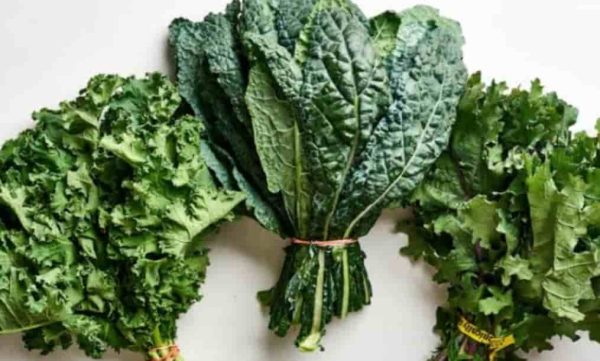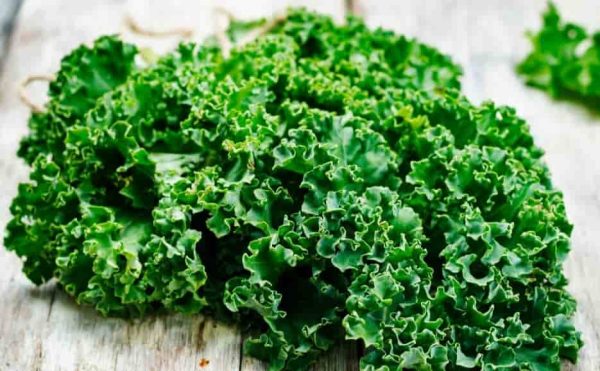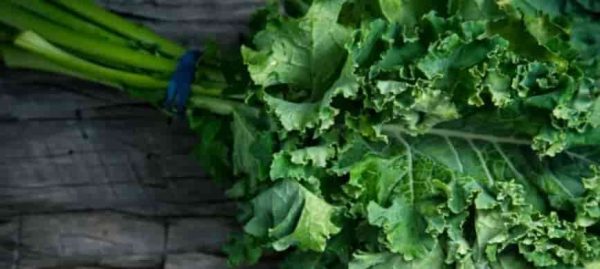Kale is a leafy dark green vegetable. It can be consumed raw or cooked. Kale is considered a superfood because it contains several kinds of nutrition. This leafy green is a rich source of Vitamin A, Vitamin B6, Vitamin C, Vitamin K, calcium, fiber, and other micro and macronutrients. Kale also offers antioxidant, anti-inflammatory, anti-carcinogenic, many healing, and immunity-building properties that keep several ailments away.
Types of Kale
There are many varieties of kale but the three most common types are
- Redbor: This type has ruffled leaves that can be red and purple.
- Curly: These have bright green ruffled leaves and are most commonly found.
- Dinosaur: The leaves are narrow and wrinkled. They are attached to a thick stem.
Benefits of Kale
Here are the health benefits of kale that are supported by science.
1. High in beta-carotene
Kale is loaded with beta-carotene. It is an antioxidant that the body can convert into vitamin A. Consuming kale daily with other foods rich in vitamin A, can help to get all the essential vitamins.
2. Excellent source of vitamin C
Kale is loaded with Vitamin C. It is an essential water-soluble antioxidant that gives many vital functions to the body’s cells. This leafy vegetable is higher in vitamin C than most other greens. You should Kale in your diet.
3. Contains anti-cancer compounds
Cancer is a state in which there is uncontrolled growth of cells. Kale contains sulforaphane, it is a substance that has been shown to help block the formation of cancer at the molecular level. The leafy vegetable also has indole-3-carbinol, which is also known to help prevent cancer. Kale is rich in compounds known to have protective effects against cancer.
4. Lower cholesterol levels
Cholesterol is used to make bile acids, which are substances that help the body digest fats. When all the fat has been absorbed and the bile acids have served their purpose, they are reabsorbed into the bloodstream and used again. Kale has some substances that can bind bile acids in the digestive system and prevent them from being reabsorbed. This process reduces the total amount of cholesterol.
5. Highly nutritious
Kale is a member of the cabbage family. There are many different types of kale. The leaves can be green or purple and have either a smooth or curly shape. Each serving contains a small amount of vitamin B6, folate, and iron. A single cup of raw kale contains the below things.
- Carbs: 1 g
- Calories: 6
- Vitamin K: 60%
- Vitamin C: 20%
- Vitamin A: 5%
- Riboflavin: 5%
- Calcium: 4%
- Manganese: 8%.
Health Benefits of Kale
1. Support eye health
Everyone does not know the health benefits of kale for the eyes. Kale is loaded with two phytonutrients, zeaxanthin, and lutein. This supports the health of our eyes and vision. This leafy vegetable is amazing for those with eyesight-related issues.
2. Support immunity
Kale is loaded with vitamin C, it has four times more than other vegetables. Kale has twice the selenium content. It also offers beta-carotene as well as vitamin E. All of these are essential for supporting a healthy immune system.
3. Skin and hair
Beta-carotene and vitamin A are essential for the growth and maintenance of all body tissues such as skin and hair. Kale contains beta-carotene, the carotenoid that the body converts into vitamin A whenever it is needed. It also has vitamin C. Our body uses vitamin C to build and maintain collagen. Collagen is a protein that provides a structure for hair, bones, and skin.
4. Support bone health
Kale is rich in vitamin K, which works with vitamin D to support healthy bone metabolism. It offers many minerals. Kale is also a good source of plant-based calcium. It is required for strong bones and teeth. This leafy vegetable has low levels of a natural compound called oxalate. The compound makes the calcium more available for absorption.
5. Maintain weight
Kale contains fiber. Fibre helps to keep you fuller for a longer time, which can help in weight loss as well as weight management. It also helps in keeping your bowel movements in check which ensures no water retention or bloating. One cup of cooked kale fulfills 10% of our daily fiber needs.
Risks of eating excessive kale vegetable
Kale provides many health benefits. But overconsumption might have some adverse effects. Individuals with hypothyroidism and kidney disease should consume this vegetable only after consulting the doctor. Because certain compounds in the vegetable can interfere with thyroid hormone synthesis. A person with kidney disease should consume this veggie in moderate amounts. A diseased kidney cannot remove excess potassium from the body.










